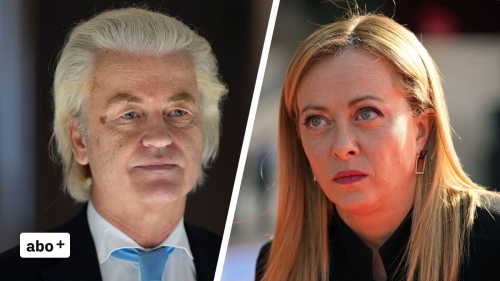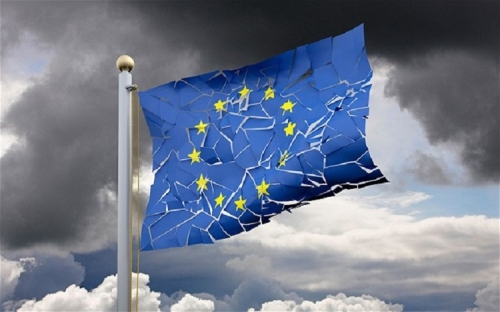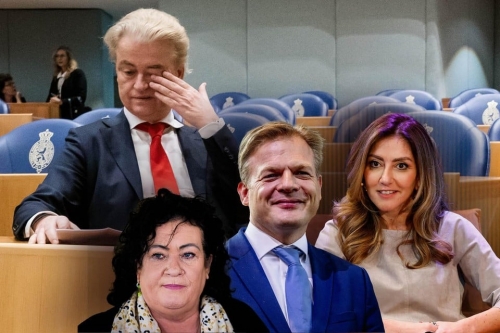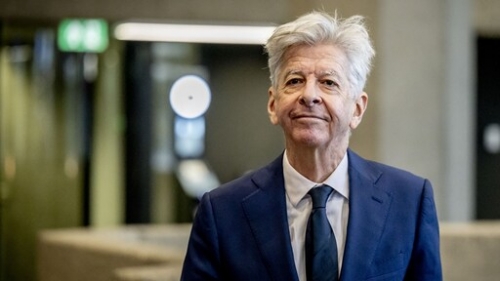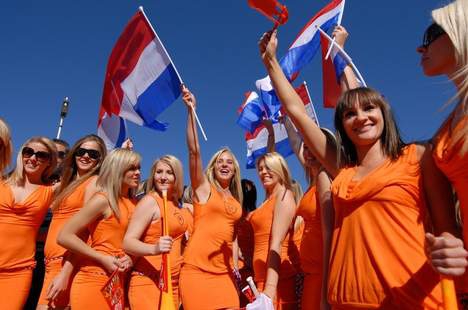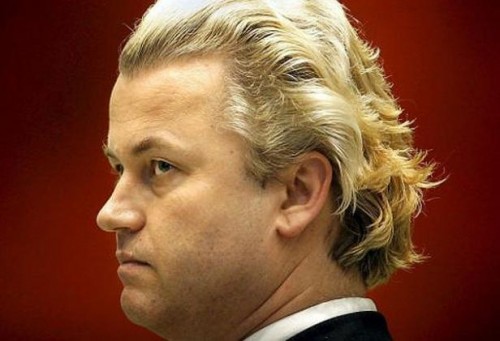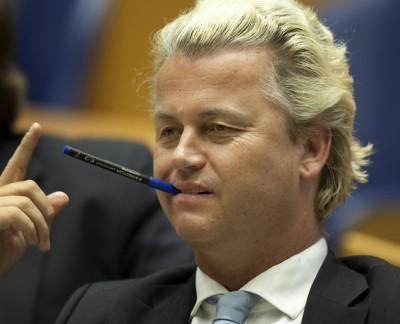Given the centrality of the Holocaust and Jewish sensibilities to the current zeitgeist favoring immigration and multiculturalism, it is interesting that some of these parties have openly courted Jewish support. They have not only proclaimed support for Israel but for the most right-wing elements within Israel—the settler movement that is championed by an increasingly large and politically influential contingent of religious and ethno-nationalist Jews.
Recently, a delegation of 35 European anti-Muslim politicians from Austria, Italy, Germany, Belgium, Switzerland, Britain, and Sweden toured the West Bank in a series of meetings hosted by leaders of the Israeli settler movement. The delegation included prominent Austrians: Heinz-Christian Strache, head of the German Freedom Party—quite possibly the next chancellor of Austria, and Claus Pandi, editor-in-chief of Krone Zeitung, the largest newspaper in Austria. The delegation also included Filip Dewinter, spokesman for Belgium's Vlaams Belang party and a member of the Flemish Parliament, and René Stadtkewitz, a former member of Angela Merkel’s Christian Democratic Union who recently established the Freedom Party in Germany with an explicitly anti-Muslim, pro-Israel line.
Not present was Geert Wilders, leader of the Dutch Freedom Party. However, Wilders was in Israel at the time, espousing similar sentiments: strong commitment to the Jewish state and expressing his belief that Palestinians should relocate to Jordan. Wilders is doubtless the most famous exemplar of this anti-Muslim, philo-Semitic, pro-Israel phenomenon. He began his speech in Tel Aviv by noting, “Israel is an immense source of inspiration for me. … I am grateful to Israel. I will always defend Israel. Your country is the cradle of Western civilization. We call it the Judeo-Christian civilization with good reason.” Indeed, Israel is a bulwark against Muslim destruction of the West:
Without Judea and Samaria [i.e., the West Bank], Israel cannot protect Jerusalem. The future of the world depends on Jerusalem. If Jerusalem falls, Athens and Rome—and Paris, London and Washington — will be next.
Wilders wants to end Muslim immigration and have the Qur’an banned for inciting violence. His 2008 video Fitna (see here and here) depicts Islam as out to conquer the world, committed to violent jihad against the West. It portrays Islam as anti-Jewish and intolerant of contemporary Western attitudes on sexuality, democracy, and personal freedom.
Wilders therefore presents himself as a classical liberal, a “libertarian” (in American parlance) for whom Margaret Thatcher is his political role model. He is a staunch defender of free speech who sees concerns about offending Muslim sensibilities as casting a pall over conventional liberal views in a wide variety of areas:
Speech now deemed suspect includes subjects that are commonly and openly aired when not involving Islam: women's subordination, violence, child marriages, criminalization of homosexuality and animal cruelty. … We believe our country is based on Christianity, on Judaism, on humanism, and we believe the more Islam we get, the more it will not only threaten our culture and our own identity but also our values and our freedom.
Note that Wilders is here ascribing a foundational role for Judaism in Western culture.
Wilders rejects any explicit appeal to race and has rejected being associated with politicians associated with racialist or anti-Jewish views. In an interview with Der Spiegel, he noted,
[W]e have no problems with other skin colors, nor with Muslims—our problem is with Islam. I do not believe in genetic causes; I am miles away from there. I believe rather that all people who embrace our values, our laws and our constitution are full members of our society. I would even go so far as to say that the majority of the Muslims in Europe are people like you and I; they lead a normal life, have a normal occupation and want the best for their children. My problem is with the growing influence of an ideology that will cost us our freedom.
It is not surprising therefore that he completely rejects the “wrong” types of politicians: “My allies are not Le Pen or Haider. ... We'll never join up with the fascists and Mussolinis of Italy. I'm very afraid of being linked with the wrong rightist fascist groups.”
Consistent with the above, he has been careful to depict Muslims entirely as imprisoned by their culture, not as racial aliens. The West is a “proposition culture” dedicated to individual freedom, whereas the Muslim religion shackles its adherents into a fatalistic worldview that leaves women in fearful subservience to their husbands. In his view, Islam promotes a political culture of fear and despotism and an economic culture of stagnation. Wilders therefore believes that non-White immigration is fine as long as the immigrants assimilate to liberal European culture. That means that Muslims are fine but they must shed their religion:
Islam deprives Muslims of their freedom. That is a shame, because free people are capable of great things, as history has shown. The Arab, Turkish, Iranian, Indian, Indonesian peoples have tremendous potential. If they were not captives of Islam, if they could liberate themselves from the yoke of Islam, if they would cease to take Muhammad as a role model and if they got rid of the evil Koran, they would be able to achieve great things which would benefit not only them but the entire world.
Wilder’s thinking on is therefore on a par with those who believe that sub-Saharan Africa would quickly become an economic powerhouse if only it adopted liberal democracy and capitalism or some other nostrum. He is definitely not an IQ realist. And his principled opposition to Islam would not be sufficient to exclude the hundreds of millions of non-Muslims who desire to relocate to Europe.
Wilders’ pro-Israel, philo-Semitic sentiments may be a cynical tactic to obtain support from Jews. However, they seem sincere and heartfelt. Quite simply, he loves Israel and repeatedly portrays Judaism as a part of the West. He has visited Israel more than 40 times beginning as a young man working on a Kibbutz. His second wife is the Jewish-Hungarian diplomat Krisztina Marfaimarried. There is some indication of Jewish ancestry. His grandfather on his father’s side was a colonial officer in Java who married Johanna Meyer, from “a famous Jewish-Indian family."
Nevertheless, it would be simplistic to ascribe Wilders’ views to either opportunism or ancestry. He is certainly far from the only Western politician who ardently believes that all peoples could become good Westerners simply by adopting conventional liberal attitudes and that Europe would be the better for it. These attitudes on race are, of course, a prominent intellectual failing of American conservatives.
The fact is that Wilders and other movements with similar attitudes have not been able to make headway with the leaders of the mainstream Jewish community, which has been the main force promoting immigration and multiculturalism as imperatives throughout the West. A recent JTA article (“Not wild about Wilders? Populists’ anti-Islam message has European Jewish leaders worried”) illustrates once again that the organized Jewish community wants a multicultural future for Europeans (whether in Europe or elsewhere), and that Islam is an entirely acceptable component of the multicultural mix.
From the standpoint of the Jewish leadership, the basic problem is that populists like Wilders “want a Sweden for the Swedes, France for the French and Jews to Israel,” in the words of Serge Cwajgenbaum, secretary general of the European Jewish Congress. This is a slippery slope argument because shipping the Jews off to Israel is certainly not Wilders’s position given that he sees Judaism as central to European culture. Indeed, the slippery slope argument was explicitly stated by Lena Posner, president of the Official Council of Swedish Jewish Communities: “We are quite upset about having a party [in the Parliament] that says they are only addressing Muslims and immigration. History has taught us about where this can lead, and this is not necessarily good for the Jews.”
 The slippery slope argument dovetails with traditional Jewish fear and loathing of homogeneous White, Christian cultures. Jewish leaders want to have their cake and eat it too: a Diaspora strategy that dilutes the power of the native peoples while promoting their own ethnic nationalism in Israel. In fact, while the idea of Sweden for the Swedes is abhorrent to Jewish leaders, Israel is now insisting that the Palestinians acquiesce in the idea that Israel is a Jewish state with scarcely a peep from the Diaspora. Israel continues to enact laws promoting apartheid and ethnic cleansing that are a far cry from anything proposed by European nationalist parties. Just recently 300 Israeli rabbis endorsed “a written religious ban on selling or renting homes, apartments, and lots to non-Jews, particularly Arabs.” Indeed, Carroll Bogert, deputy executive director of Human Rights Watch recently noted,
The slippery slope argument dovetails with traditional Jewish fear and loathing of homogeneous White, Christian cultures. Jewish leaders want to have their cake and eat it too: a Diaspora strategy that dilutes the power of the native peoples while promoting their own ethnic nationalism in Israel. In fact, while the idea of Sweden for the Swedes is abhorrent to Jewish leaders, Israel is now insisting that the Palestinians acquiesce in the idea that Israel is a Jewish state with scarcely a peep from the Diaspora. Israel continues to enact laws promoting apartheid and ethnic cleansing that are a far cry from anything proposed by European nationalist parties. Just recently 300 Israeli rabbis endorsed “a written religious ban on selling or renting homes, apartments, and lots to non-Jews, particularly Arabs.” Indeed, Carroll Bogert, deputy executive director of Human Rights Watch recently noted,
Palestinians face systematic discrimination merely because of their race, ethnicity, and national origin, depriving them of electricity, water, schools, and access to roads, while nearby Jewish settlers enjoy all of these state-provided benefits. While Israeli settlements flourish, Palestinians under Israeli control live in a time warp—not just separate, not just unequal, but sometimes even pushed off their lands and out of their homes.
The knee-jerk attitude among liberal Jews who are dominant in the Diaspora in the West is that attempts to restrict immigration conjure up images of National Socialism. Adar Primor, editor of the English edition of the liberal Israeli newspaper Haaretz, may be seen as representative of this strand of Jewish thinking. She agonizes about the “very unholy alliance between figures on Israel's right and extreme nationalists and even anti-Semites in Europe that is gaining momentum in the Holy Land.”
The organizers of these visits believe they have tamed this bunch of extremists they brought over from Europe, who after trading in their Jewish demon-enemy for the Muslim criminal-immigrant model are now singing in unison that Samaria is Jewish ground. Soon they'll be sprouting beards and wearing kippot. But they have not genuinely cast off their spiritual DNA, and in any event, they aren't looking for anything except for Jewish absolution that will bring them closer to political power.
Primor’s statement that the Europeans are looking for “Jewish absolution” is a telling comment on the perceived power of Jewish sensibilities to the current multicultural zeitgeist in the West. From my standpoint, this view of Jewish influence has a strong basis in reality.
As a Left-liberal, Primor rejects Wilders’s solution of transplanting the Palestinians in Jordan. But her choicest words are for Dewinter and Strache, both of whom she sees as having connections to the Nazi past. Dewinter is excoriated because he “moved about in anti-Semitic circles and has ties to European extremist and neo-Nazi parties.” Strache belonged to an “extremist organization from which Jews were banned, hung out with neo-Nazis and participated in paramilitary exercises with them.”
The past history of these figures will doubtless continue to follow them even as they eschew anti-Jewish comments and voice strong support for Israel. Similarly, Martin Webster has suggested that Jews have not supported the British National Party despite its pro-Israel stance at least partly because of Nick Griffin’s past anti-Jewish statements and associations. In France, Jean-Marie Le Pen has a history of statements that have angered Jews. However, Marine Le Pen, who will succeed Jean-Marie as head of the National Front, has “notably refused to echo the anti-Semitic views expressed by her father.”
Reflecting these sensibilities, the organized Jewish community in the Diaspora has consistently supported Muslim immigration and has actively forged ties with the Muslim community. For example, the ADL strongly supports the political and cultural aims of Muslims in America. Predictably, Abe Foxman is incensed at Wilders’ failure to agree with both prongs of the Jewish strategy, loving multiculturalism at home and an ethno-nationalist, apartheid Israel abroad, even though the former is obviously against Wilders’s interest as a European: “It’s akin to the evangelical Christians. … On one hand they loved and embraced Israel. But on the other hand, we were not comfortable with their social or religious agenda.”
Overall, there is no evidence that European Jews are rushing to support the nationalist parties. An article on a Dutch Jewish site pointed out that only two percent of Dutch Jews voted for Wilders, including young Jews (compared to the 25 percent of the native Dutch who voted or Wilders’s party in the general elections of 2010). The majority of Jewish votes go to the liberals and socialists (58 percent). Only three percent voted for the major Christian party, the center-right Christian Democratic Appeal, the fourth most popular party in the 2010 election, with 13.7 percent of the popular vote. Jews obviously like Wilders’s message even less than a party devoted to Christian morality. Wilders can depend on support from radical Jewish colonists on the West bank or some renegade Israeli generals, but if Wilders campaign against the Muslims succeeds, it will be without the help of Dutch Jews.
The other way to see this is from the perspective of ultra-nationalists within Israel. Nationalist European parties are not alone in their search for legitimacy. Some Israeli ultra-nationalists see a world in which Israel is becoming increasingly rejected by European elites who see it, correctly, as an ethno-nationalist state bent on apartheid and ethnic cleansing. The EU has been quite critical of the Netanyahu government, the settlements, and the Gaza embargo. (See also here and here.) It provides substantial funding for the Palestinian Authority. The Israeli ultra-nationalists are also worried about the Boycott, Divestment, and Sanctions movement which is making real progress in isolating Israel. And even the vaunted Israel Lobby in the United States may be on the wane, if Josh Reubner, writing in Mondoweiss, is correct:
Growing unease on Capitol Hill over these “one-sided resolutions” is attributable to several factors: Israel’s deliberate humiliation of President Obama on settlements; recognition that Israeli and U.S. interests are not one and the same; and a hard-to-define yet palpable Israel fatigue.
The settlers are reaching out because they see their cause as needing support. And in order to get the support of the nationalists, they are willing to accept their expressed philo-Semitism and love for Isarel. David Ha'ivri, a prominent spokesman for the settler movement, has noted, “If these European leaders—with their ties to anti-Semitic groups and their past—come around and declare that Israel has a right to exist securely in all of the areas under our control, and that Europe has a moral responsibility because of the crimes of their past, then I believe that we should accept their friendship.”
Their statements are the strongest possible tool in the war against anti-semitism. No skinhead cares what [Anti-Defamation League Chairman] Abe Foxman has to say, but if Filip Dewinter and Heinz-Christian Strache make these statements they will have real impact. For that reason I am considering appearing with them in their countries for pro-Israel rallies. I think that it is worth the risk of being defamed by Ha'aretz and the like if we can cause a shift in the European nationalist movements, moving them away from their traditional Jew-hatred and bringing them closer to appreciation of Zionism. I don't think that I am naive to feel that this is a revolutionary opportunity.
Nevertheless, Ha’ivri’s views are not universal on the Israeli right. No member of the Knesset met with the European delegation, including even those allied with Ha’ivri’s nationalist views.
On the other hand, Wilders was hosted by Aryeh Eldad, a secular rightist member of the Knesset representing the Hatikvah faction of the National Union Party. Eldad is a strong backer of the settler movement (the Arabs on the West Bank are occupying Israeli land) and is committed to preventing a Palestinian state. This may signal a bit more support for Wilders on the Israeli right, but certainly far from even a glimmering of a consensus.
So what can we make of all this? Diaspora Jews in the West react primarily as a Diaspora group, and that means identifying with the multicultural, pro-immigration, anti-White Left. The Jewish identification with the Left is a strategy designed to increase Jewish power as an elite with a long history of fear and loathing of the White European majority of America. Indeed, the organized Jewish community has not only been the most important force in ending the European bias of American immigration laws, it has assiduously courted alliances with non-White ethnic groups, including Blacks, Latinos, and various Asian groups.
Within this worldview, Jews want Muslim immigration but they want a housebroken Islam in Western societies, free of anti-Semitism and not prone to terrorism, particularly terrorism motivated by anti-Israel sentiment. It is noteworthy that even neocon Daniel Pipes, who is known as an “Islamophobe,” is far less radical than Wilders in his opposition to Islam. He states, “Our goal has to be to build and help with the development of a moderate Islam that [Wilders] says doesn’t exist and can’t exist. So we are allies, but there is a significant difference.” In other words, Pipes, like other Jewish leaders, wants a manageable Islam in the West while strongly supporting an ethno-nationalist Israel.
The desire for a housebroken Islam is also consistent with the history of portraying Arabs negatively in the U.S. media. Jack Shaheen’s Guilty: Hollywood's Verdict on Arabs After 9/11 shows that Hollywood, well-known to be a Jewish fiefdom, portrays Arabs as terrorists, corrupt sheiks, or exotic, camel-riding primitives. As Edmund Connelly notes, such media presentations are also likely to influence audiences throughout the West to be more favorable to wars against Muslim countries. In this regard, it is noteworthy that images of Blacks and Latinos are air brushed to make them attractive to audiences. Arabs are the only non-White group that is not given a free pass in the Western media.
Similarly, in the U.K., the Board of Deputies, the official organization for British Jewry, has consistently reached out to Muslims (see, e.g., here). The organized Jewish community has condemned the English Defense League, which has a strong anti-Muslim, pro-Israel line along with a tiny Jewish section. Again reflecting the power of the slippery slope argument among Jews, the President of the Board of Deputies of British Jews stated,
The EDL's supposed “support” for Israel is empty and duplicitous. It is built on a foundation of Islamophobia and hatred which we reject entirely. Sadly, we know only too well what hatred for hatred's sake can cause. The overwhelming majority will not be drawn in by this transparent attempt to manipulate a tense political conflict.
Nevertheless, Martin Webster notes, “in the Jewish-owned sections of the UK media, there is a flood of anti-Muslim, anti-Islam stories. This barrage is so relentless that for the average Briton the words ‘Muslim’ and ‘Islam’ have become hardwired to the word ‘terrorist’.”
In other words, Jews across the political spectrum—even Jews closely connected to anti-Muslim rhetoric—retain the dream of a utopian multicultural West in which Judaism finds safety as one of many cultures within a fractionated political culture. All of the mainstream Jewish organizations are on board with making connections and alliances with Muslims, as they have with other non-White groups. All are opposed to Wilders and the other pro-Israel, philo-Semitic parties. Muslim organizations are also doing their part by joining the pro-immigration advocacy movement and its desire to make Whites a minority as soon as possible.
A paper recently put out by the Muslim Public Affairs Council in the U.S. advocates the entire wish list of the anti-White coalition: Support for the DREAM act, providing illegals with an easy path to citizenship, and raising the numbers of legal immigrants.
I would suggest therefore that the pro-Israel, philo-Semitic rhetoric of the main European nationalist parties is not effective and will not be effective in recruiting Jewish support. Very few Jews vote for these parties and even the great majority of ethno-nationalist Jews in Israel seem wary or at least ambivalent about making a public alliance with these groups.
I suggest that the main function of this rhetoric on the right may well be in convincing non-Jews that voting for these parties is not an affirmation of National Socialism, anti-Semitism, or racialist sentiments. And because of the abject terror that most Whites have of being associated with those ideas, it may well be an effective strategy that could, in the long run, lessen the inhibitions that Europeans now have about preserving Europeans and their culture. The progress of these parties is certainly very heartening.
Assuming as obvious that Muslims will not give up their religion and suddenly become good liberal Europeans, success by Wilders and similar political movements would certainly be a huge step in the right direction. Success would mean that eventually Muslims would be strongly encouraged or even forced to leave, and Europe would have a renewed sense of cultural identity.
It would then be a short step to the realization that some cultures are simply unable or unwilling to adopt contemporary liberal European values. Europeans would be much closer to the realization that their individualist, libertarian tradition is fundamentally at odds with pretty much the entire rest of the world.
Moreover, success of these parties would embolden anti-immigration sentiment throughout the West, including countries like the United States whose main immigration problem stems from the failed states of Latin America rather than Islam. There is much to be said for the slippery slope argument that once Muslims are successfully targeted as unassimilable, Europeans and other Westerners will realize that other groups, such as African-derived peoples, Latinos, and Asians, have not been successfully integrated either. One can easily see the anti-immigration movement snowballing as Europe develops a renewed sense of cultural identity and confidence.
Such developments would be anathema to the great majority of the organized Jewish community, and the great majority of Jews throughout the West. Not only would this shatter their dream of the demise of a dominant European Christian culture, it would also feed into their worldview that targeting any immigrant group is a slippery slope that ends with another Holocaust.
So don’t count on any help from the Jews. But as tensions with Muslims continue to mount and as Europeans see that they really must choose between expelling Muslims and preserving a livable society, Jews may be powerless to stop the ultimate success of these parties.
More generally, the self-portrait of Jews as an enlightened, progressive group with a long history of victimization at the hands of Europeans is coming unraveled by the rise of a strident ethno-nationalism in Israel. As I wrote in Separation and Its Discontents, beginning with the Enlightenment, Jews have sought to refashion themselves as adhering to “the most ethical of religions, with a unique moral, altruistic, and civilizing role to play vis-à-vis the rest of humanity—modern versions of the ancient 'light unto the nations' theme of Jewish religious writing." When most Americans think of Jews, they think of the friendly doctor who lives in the neighborhood, the brilliant scientist at the university, or the liberal social activist on behalf of the downtrodden. They think of Israel is “the only democracy in the Middle East" and a "staunch ally" of America.
However, the ethno-nationalist right is in the driver’s seat in Israel, and they will continue to increase their power because of their relatively high fertility compared to liberal secular Jews. The image of Jews as enlightened liberals is increasingly being replaced by images of Jews as religious fanatics and racists bent on ethnic cleansing and apartheid.
In the long run, these images cannot coexist. Thoughtful people in the West will understand that the pose of enlightened liberalism, tolerance, and pro-multiculturalism is simply a Diaspora strategy designed to diminish the power of the traditional peoples in those societies. It reflects the same brand of ethnic hardball that is being played out in Israel, but in a different context where Jews, as a minority, must make alliances with other groups.
When Westerners come to grips with this reality, it will have a transformative effect on our political culture. The opposition of the organized Jewish community to the rise of an anti-Muslim, philo-Semitic right in Europe will be seen as increasingly threadbare intellectually given the reality of what is going on in Israel. And that too will contribute to the ultimate resurgence of European ethnonationalism.



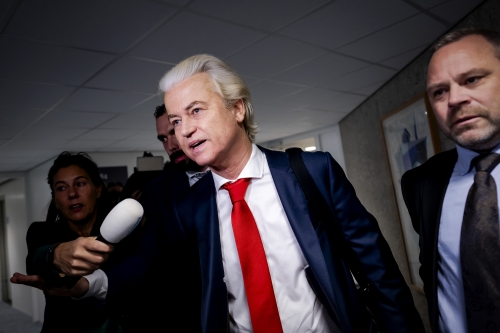

 del.icio.us
del.icio.us
 Digg
Digg